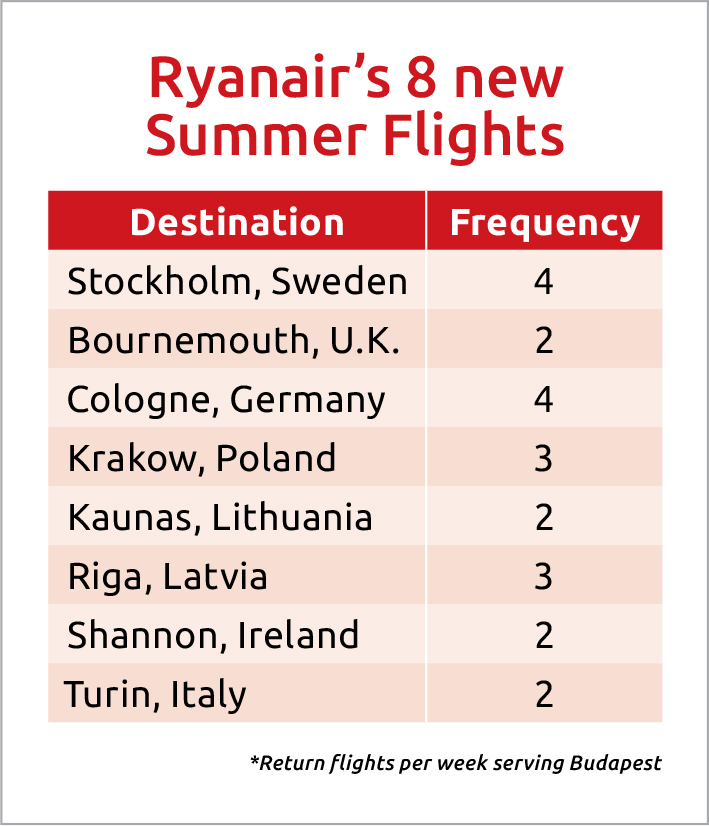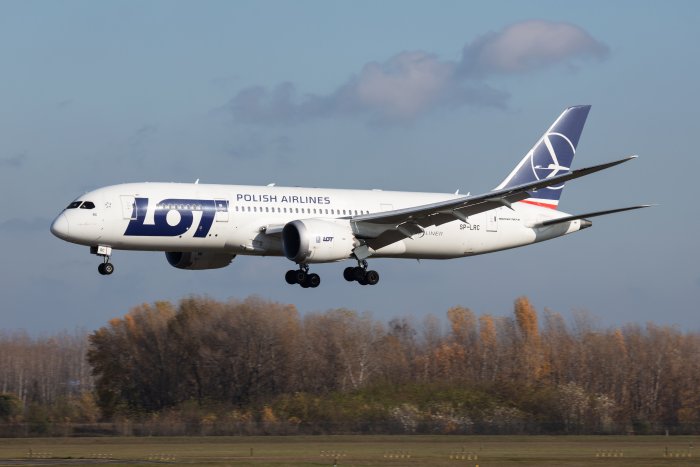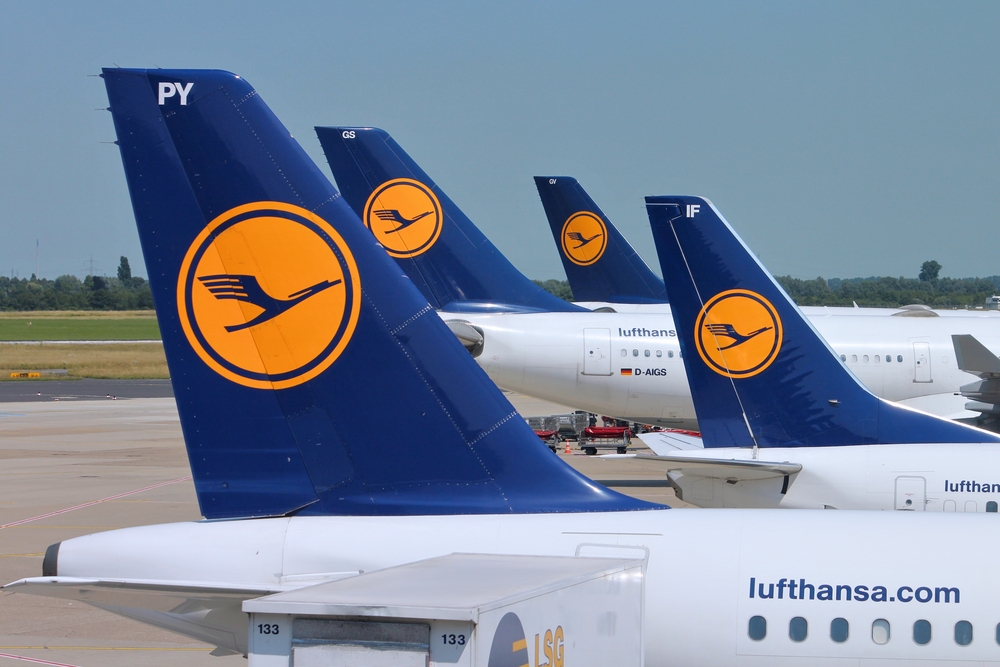Ryanair Expands Operations in Budapest, Predicts Growth in Region

Jason McGuinness
Ryanair, the Irish-based budget airline, is to expand its Budapest operations with the allocation of two Boeing 737 8-200 aircraft, enabling the carrier to boost its total daily flights serving the Hungarian capital in the summer timetable from 50 to 70, Jason McGuinness, Ryanair’s chief commercial officer, told a press conference on Feb. 24.
The new schedules mean Ryanair will operate 62 routes from Budapest after March 27, adding eight new destinations to the roster, including Swedish capital Stockholm, two Baltic states and the major northwest German city of Cologne. (See box)
“This is over 50% more routes versus 2019, [... this is] incredible growth during the pandemic. We think [the additional flights] will increase passengers from somewhere in the region of three million to 4-4.5 million, so extraordinary growth in Budapest,” an ebullient McGuinness predicted.
He stressed the new 737 8-200s have 4% more capacity (197 seats versus 189) than Ryanair’s earlier version of the mark and also burn 16% less fuel, with 40% less noise emissions, though it was not clearly specified to what the latter figures were compared.
The additional aircraft will result in Ryanair employing a total of 240 “highly paid” aviation positions in Budapest and 4,000 jobs indirectly, McGuinness asserted, assuming the industry norm that one million passengers create an additional 1,000 jobs as a knock-on effect.
The move also represents an additional USD 200 million investment, bringing the total of Ryanair’s investment in Hungary to USD 800 mln, he said. Quizzed later on this, McGuinness admitted this was purely the value of the aircraft, with no fixed capital investment involved.
“I don’t think there is any fixed investment [these days]. A company can build a factory and pull it down; nothing is forever,” he replied in defense of the claim, adding, “This is a huge economic enabler in terms of economic development for Budapest.”

Strategic Policy
As a matter of strategic policy, Ryanair had maintained all its staff throughout the COVID pandemic. While other carriers were parking planes in the desert, McGuinness emphasized that it had even increased its orders for new Boeings from 135 to 210 aircraft. As a result, the carrier is well placed to benefit from an expected fast recovery in the sector this year, assuming the COVID pandemic recedes.
Despite this, Ryanair expects total demand across Europe this year to be some 10% down on 2019 numbers. However, given that the carrier is planning to expand its fleet to 620 aircraft flying 225 million passengers by 2025, he said “progressive” airports are “queuing up” to lure the Irish carrier into using their facilities.
“I’ve been in the commercial department of Ryanair for well over 15 years, and I’ve never seen so many airports eager to engage [with us],” he said.
While the expansion would include developments in Hungary and across the region, the otherwise verbose McGuinness was strictly tight-lipped as to where and when despite several promptings.
The critical metric for all flight planning is costs, he stressed, and “progressive airports” such as London Stansted, Charleroi, and several Italian locations, all of which have signed long-term agreements with Ryanair, would reap the benefits. In contrast, others, such as Frankfurt Main, where the carrier had 10 aircraft based in 2018, are being dropped.
“I’ll be very blunt; we failed to reach an agreement with Frankfurt Main. They were looking to increase their charges and passenger targets,” he said. “Frankly, in the current market, Ryanair simply has too many opportunities to be paying higher charges.”
Good Relations
McGuinness declined to reveal the length of the contract with Budapest Airport, merely saying that “we have very good relations” with the operator.
Pressed in private by the Budapest Business Journal for some hint as to where developments might come, with a special mention of Debrecen in particular, he expressed confidence in growth for Hungary and the region, particularly Poland, but kept quiet on any future details.
Nonetheless, Ryanair is clearly very alert to the potential, citing rapid success at Zagreb recently.
“I’ve been very, very happy with the way Zagreb has started,” he said, adding Ryanair was flying “well over 30 routes” from the Croatian capital after just 18 months of operations.
Asked about the effects of Brexit on traffic to London and the United Kingdom in general, an important market from Central Europe, McGuinness said it was difficult to assess because of the near-simultaneous impact of the coronavirus pandemic.
“You’re quite right, that is a large market in terms of migration, in terms of those flows, [but] the consequences of Brexit have yet to play out because when Brexit finally got finalized, we had COVID. I think we’ll need a full 12 months of non-COVID to see exactly how traffic flows play out in terms of whether it has fundamentally restructured that market,” he explained.
Ryanair Suspends all Flights to Ukraine
Ryanair announced the new flights serving Budapest on Feb. 24, the very morning that news broke of the Russian invasion of Ukraine. The airline, which flew to Kyiv, Lviv and Odesa, immediately suspended all flights serving Ukraine for a minimum period of 14 days. Jason McGuinness said the situation was “very fluid” and would not comment further on the statement regarding Ukraine flights.
Asked by the BBJ what impact the conflict was likely to have on passenger demand to Hungary and other countries neighboring Ukraine, McGuinness balked, then sought to answer another question.
“When you look across the summer in terms of looking at demand, I can’t tell you how people are going to think. Clearly, this is not ideal, we do not want this on our doorstep in Europe, but I’m not going to start commenting on geopolitical events. I think it’s now for the EU, etcetera, to deal with this […] not Ryanair.”
Before going to press, the Ryanair website stated that the suspension of flights to Ukraine had been extended to the end of March.
This article was first published in the Budapest Business Journal print issue of March 11, 2022.
SUPPORT THE BUDAPEST BUSINESS JOURNAL
Producing journalism that is worthy of the name is a costly business. For 27 years, the publishers, editors and reporters of the Budapest Business Journal have striven to bring you business news that works, information that you can trust, that is factual, accurate and presented without fear or favor.
Newspaper organizations across the globe have struggled to find a business model that allows them to continue to excel, without compromising their ability to perform. Most recently, some have experimented with the idea of involving their most important stakeholders, their readers.
We would like to offer that same opportunity to our readers. We would like to invite you to help us deliver the quality business journalism you require. Hit our Support the BBJ button and you can choose the how much and how often you send us your contributions.








